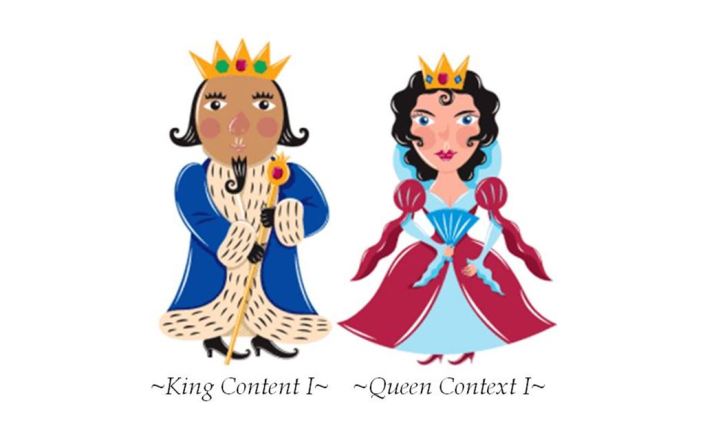Content is King! This ubiquitous online marketeers’ mantra means that if your online presence doesn’t grab your readers’ attention, it won’t bring you much business in return. The same applies to your résumé, of which you could also say Context is Queen!
What exactly is context, you ask? A subset of content, context is a fundamental element of storytelling, the key to powerfully developing many of the materials (résumés, LinkedIn profiles, portfolios, websites, blogs, audio clips, video clips, infographics, etc.) by which one expresses and exudes one’s personal brand… and the better your good-news stories, the more people will come looking for you.
The “secret sauce” in the résumés that I write for my own clients, context is essential because it enhances the imagery that zips through the readers’ minds. By describing the bigger picture, it underscores the significance of one’s accomplishments in two of the most important résumé sections: employment and education.
Using coloured text (red, green, blue, brown, and orange), this article will illustrate five main types of résumé context.
The Employment Section…

Context is most powerfully used to describe the obstacles surmounted during work-related accomplishments:
- resource (time, talent, money, materials, suppliers, etc.) scarcity
- competitors’ actions
- labour disruptions
- legal and regulatory hurdles
- environmental problems
- political events and social upheavals
- technological obsolescence
Each of these problems is a type of “challenge context” (time scarcity could be called “time context“), and including them really energizes one’s accomplishments:
Example:
- Took a brand-new sales territory from zero to 250% of the average territorial dollar volume.
…seems impressive, but it could be much more eye-opening:
- Took a brand-new sales territory, in 6 months, from zero to 250% of the average territorial dollar volume despite predatory pricing by competitors while building product knowledge from scratch.
This client was thrown to the wolves (his competitors) and had one heck of a learning curve – but he prevailed, achieving a remarkable sales increase in only half a year!
Example:
- Reduced departmental spending by 15%.
…is pretty dull, but we could really make it shine:
- Reduced departmental spending by 15% over two consecutive quarters, despite the union winning a 9% base pay increase during the same period.
Despite a whopping increase in labour costs, this client managed to cut overall expenditures significantly and quickly!
Example:
- Created formal alliances with four key suppliers.
… isn’t all that interesting, but it could be a lot more remarkable:
- Created formal alliances with four key suppliers during a three-month period while they were being aggressively courted by our competitors.
This client fought off serious supply-chain poaching, and he did it in short order!
“Actions context” is a third type of context. And although he doesn’t name it as such, Don Orlando – my colleague and a careers industry thought leader – discusses action context in his LinkedIn post “Is your résumé in context?” Don’s point is that instead of just saying what happened (i.e. naming an accomplishment), it is much more powerful to describe what one did in order to make it happen.
The Education Section…

Context also brings a lot of power to the post-secondary discussion. Most commonly, this would be “extracurricular context” such as sports and volunteerism (ideally, with leadership prominently featured).
“Family context” can also enhance the Education section. Students’ circumstances can be eye-opening and even heart-wrenching; I’ve had clients who were saddled with responsibilities like eldercare, single parenting, and even raising younger siblings in a zero-parent household – all of this while pulling a heavy academic sled and maybe having to work as well.
In addition to extracurricular activities and family responsibilities, “financial context” and “awards context” are great sources of educational context, as Don Orlando explains in his LinkedIn post “The most undervalued portion of your résumé“.
If done thoroughly, contextual analysis really makes the Education section sizzle:
Bachelor of Science (Chemistry Major), Emory University, 1994.
becomes
Bachelor of Science (Chemistry Major), Emory University, 1994. Graduated 5th in a class of 355. Captained the varsity rugby team and founded the “Emory’s Eloquent” student Toastmasters club. Worked 25 hours a week and single-parented two boys under the age of 5.
(…wow! Who wouldn’t want interview a guy like THAT?…)
and
Master of Business Administration (Honours Finance), University of California (Berkeley), 2006.
turns into
Master of Business Administration (Honours Finance), University of California (Berkeley), 2006. Graduated Summa Cum Laude. Lead investor with the Portfolio Management Society. Cared for elderly parents 20 hours a week and juggled 3 part-time jobs.
(… now THERE’S a woman who knows how to focus!…)
In Conclusion…
If judiciously and concisely expressed, context will elevate one’s résumé from tiresomely mundane to truly spectacular.
It is true that building in context might increase the word count (and perhaps even the number of pages). However brevity, while desirable, should never be achieved by minimizing context. Three pages of vivid, compelling material is vastly superior to a one-page skeleton or two pages of drivel.
 Hopefully, now you have a better understanding of how important it is to consider the “bigger picture” when distilling your résumé’s material. You’ve learned about five powerful types of context (pop quiz: can you name them all?… here’s a hint: follow the colours) and you understand how if “Content is King”, then surely “Context is Queen”!
Hopefully, now you have a better understanding of how important it is to consider the “bigger picture” when distilling your résumé’s material. You’ve learned about five powerful types of context (pop quiz: can you name them all?… here’s a hint: follow the colours) and you understand how if “Content is King”, then surely “Context is Queen”!
Paul Raworth Bennett (Founder and Principal of NOVA Career Strategies) is a résumé expert, LinkedIn consultant, and Reach-certified Personal Branding Strategist. If you want to star in your own career, Paul would be happy to connect with you via the NOVA Career Strategies website, his Twitter account, or through his LinkedIn page.
